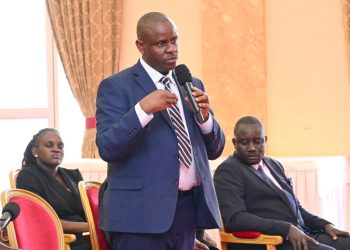Members of Parliament were yesterday shocked to learn that Bank of Uganda (BOU) flouted all the procurement procedures in the sale of Gold Trust Bank to dfcu Bank. Documents presented to the parliamentary committee on commission, statutory authorities and state enterprises (Cosase) investigating the closure indicated that the bank was sold to dfcu before it was closed and that the deal was not authorised by the board.
According to the documents, BOU signed a confidential agreement with dfcu Bank on July 10, 2014 and on July 25, 2014 revoked the bank’s licence, contrary to the BOU Act.
“How can that happen? You sell before you close? The law requires you to first take over management for six months and if the institution does not comply with the prudential financial standards, then you close it. But in this case, the bank was closed and taken over on the same day,” MP Moses Kasibante said.
The agreement was signed by the then executive director in charge of supervision, Justine Bagyenda, on behalf of BOU and dfcu managing director Juma Kisame on behalf of dfcu. Global Trust Bank was one of the commercial banks that started operations in 2008 and was closed in 2014 on account of accumulated losses to a tune of sh60b. Its closure came two years after the collapse of National Bank of Commerce in 2012.
Although BOU closed the bank in accordance with the Financial Institutions Act 2004, the Auditor General, John Muwanga, revealed that BOU sold the bank to dfcu without internal guidelines, regulations or policies in place to guide the identification of the buyer and valuation of the assets. “Therefore, I was unable to determine how the buyer was selected and also establish how the purchase and assumption agreement was arrived at. In the absence of guidelines and procurement records, I could not ascertain whether BOU selected and evaluated the bids in line with the evaluation criteria,” Muwanga stated.
During the meeting yesterday, Bagyenda and the BOU head of legal, Margaret Kasule, came under fire for exposing Global Trust Bank’s financial details to dfcu before the closure. The MPs also wanted to know how dfcu got to know about the deal. Bagyenda also came under fire for signing on behalf of BOU, yet she was reportedly not authorised.
The BOU Act stipulates that agreements are only signed by the governor, his deputy and the board secretary.
Trouble started when MP Michael Tusiime said: “Negotiationsfor takeover were done before the agreement was signed contrary to the BOU Act.For you to have signed the agreement, it means you disclosed the bank’sfinancial affairs to the buyer. Did you seek their permission as required bySection 40 (3) of BOU Act?”
Bagyenda, however, bounced the question to Kasule, who admitted to drafting the agreement, but denied being part of it or being consulted before the signing. “So madam Bagyenda, why did you disclose the bank’s financial information to strangers, yet it had been entrusted with you as a regulator?” committee chairperson Abdu Katuntu asked.
Bagyenda said the decision was not taken by her as an individual, but the management and board of the bank. But when BOU governor Emmanuel Mutebile was asked to explain, he referred the matter to the board secretary, Hellen Susan Wasagali Kanyemibwa.
“I have the minutes of the board meeting from January2014-December 2014, this issue was never discussed,” Kanyemibwa said asBagyenda struggled to explain.
“My view is that thisconfidential agreement was drafted by the legal department. I assumed that theyhad followed all the procedures,” Bagyenda said as MPs asked her why shesigned.
































































